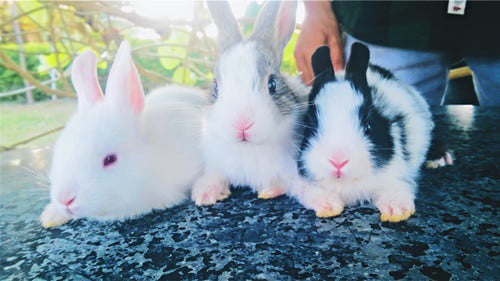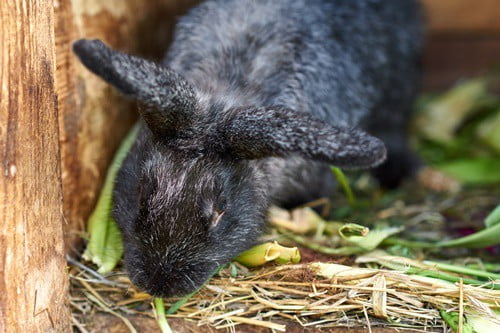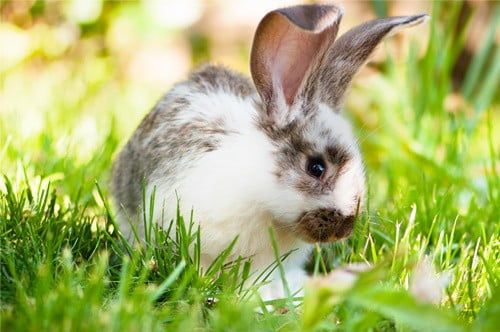Rabbits can be hard to read, but understanding their body language can tell you a lot about how they are feeling. Purring or teeth chattering is an involuntary way rabbits express their emotions. However, even purring can have a wide variety of different meanings.
Rabbits click their teeth or purr when they’re happy, comfortable, or content. A happy purring sound is smooth and uninterrupted. However, rabbits also chatter their teeth when they’re in pain or are stressed. This type of chattering is called teeth grinding and is often louder and more spaced out.
The sight of your rabbit’s teeth chattering can be simultaneously appealing and concerning. You may find yourself asking whether your rabbit is happy, or dissatisfied, or if it is in pain. Fortunately, there are various ways to distinguish a happy purr from uncomfortable teeth grinding.
What Does Rabbit Purring Mean?
A rabbit may purr when it is happy. However, cats use their throats to purr, whereas rabbits create their purring sound by lightly rubbing their teeth together. A rabbit’s purr often resembles a soft chattering sound and is just as soothing as a cat’s purr.
Your Rabbit Feels Content
When a rabbit is giving off a rapid, yet smooth sound using its teeth, it indicates that it is feeling relaxed and content. This often happens when you stroke or cuddle your rabbit. Your rabbit is trying to tell you that it is happy, or that it trusts you.
Note that a rabbit’s purr is a very soft sound. You may only hear it when you are close to your rabbit, for example, when you’re kissing it or snuggling its face. Your rabbit may also show its contentment by moving its jaws and whiskers slowly while clicking its teeth.
Your rabbit’s purr may be accompanied by gentle twitching of the nose or other parts of the body. Just make sure you’re able to differentiate normal twitching from trembling or shaking that may be a sign of stress or an underlying health issue.
Your Rabbit Feels Safe
Your rabbit may make this sound when it is feeling particularly peaceful. This can be in the middle of a stroking, petting, or bonding session between you and your pet. It may also mean that your rabbit feels entirely at ease and safe around you.
If you want to feel your rabbit’s purr, place your hand on the side of your rabbit’s face. A rabbit’s purr is a gently teeth grinding which should feel like a vibration originating from its molars.
If your rabbit feels safe, you’ll also notice its eyes are half-closed while it purrs. Therefore, if you notice your rabbit chattering its teeth regularly while being petted or stroked, chances are you’re doing a great job keeping it comfortable and happy.
Your Rabbit is in Pain
At the other end of the spectrum, a rabbit purring may be an indicator of pain or discomfort. Cats are similar in this way as well. Some experts believe cats purr when they’re in pain as a means of soothing themselves, similar to a child sucking his or her thumb to feel better.
Common causes of pain that may cause your rabbit to chatter or grind its teeth include:
- Physical trauma. Rabbits have delicate bones. Therefore, if your rabbit falls from a height or is accidentally dropped, it will suffer a painful injury.
- Pain after surgery. Surgery (such as spaying or neutering) can be uncomfortable and distressing for a rabbit. Your rabbit may grind its teeth for a couple of days.
- Joint pain. Aging increases the risk of arthritis and other degenerative bone diseases in rabbits. Your rabbit’s limbs will hurt every time it moves, so look out for any red flags.
- Dental pain. Rabbit teeth grow perpetually, so they need to be worn down by regular chewing of fibrous foods such as hay. If your rabbit’s teeth continue to grow, they will cause severe pain. Gum disease is another cause of dental pain in rabbits.
- Gastrointestinal problems. Gastrointestinal problems, such as GI stasis that involves intestinal blockage can cause severe pain in rabbits. If left untreated, digestive issues can be deadly.
While there isn’t much research on why rabbits chatter their teeth when they’re in pain, it helps as an owner to pay attention to your pet. Search for other signs of pain, such as pressed down ears or a crouched posture. Your rabbit may need veterinary attention.

Importance of Pain Management
Excessive pain can prolong your rabbit’s recovery time from injury or disease. According to the Rabbit Welfare Association and Fund, it also causes rabbits to lose their appetite and stop eating. This slows the digestive tract, and eventually shuts it down, causing death.
Excessive pain can also cause rabbits to go into shock and die within 1 to 2 days, even if the injury or disease itself isn’t life-threatening.
If your rabbit is grinding its teeth and showing other signs of discomfort, pain management is vital for its early recovery. Pain control decreases stress associated with surgery, improves breathing functions, decreases hospital stay lengths, speeds up mobility, and even diminishes the spread of cancer following surgery.
Furthermore, your rabbit will return to its normal behavior and eating habits as soon as it is given relief from pain. Therefore, if your rabbit grinds its teeth, early recognition, and quick management of stress and anxiety can help support veterinary treatment.
Rabbits do feel pain and stress and may grind their teeth following invasive surgeries, such as spaying and neutering. Talk to your veterinarian about pain relievers during surgery and for at least 24 hours following the procedure.
Your Rabbit is Stressed
Teeth grinding or chattering isn’t always a sign of contentment, and maybe an indication of the opposite. Your rabbit may make this sound if it is emotionally distressed with nervousness, anxiety, or fear.
Chattering could mean that your rabbit is in panic mode, because of a new or an unfamiliar situation, for example. Your stressed rabbit may even chatter its teeth at you while its eyes are prominently protruding out of its head.
If your rabbit is stressed, eliminating the source can help. Common causes of stress include:
- Small and unsanitary living spaces
- Too much time in the enclosure
- Too much time alone
- Too much light in the hutch
- Warm temperatures
- Inadequate ventilation in the hutch
- Loud, abrupt noises (such as lightning or noisy neighbors)
- Unfamiliar experiences, such as car rides or seeing a vet
- Changes in routine, especially those involving feeding time and play
- Not being with a bonded friend any longer
- Boredom or not being able to dig, run, hop around or climb
- Any unwanted company, such as a pet cat or a dog
- Presence of predatory animals
- Another dominant or bullying rabbit
Rabbit Chattering While Sleeping
You might notice your rabbit grinding its teeth while sleeping. While petting its head, you may even feel its chin and cheeks vibrating. Luckily, your rabbit is actually making purring sounds and is telling you that it’s happy and comfortable.
In most cases, rabbits purr while being petted and may also drift into sleep this way. At times, when rabbits are asleep, you may notice a slight cheek, head, or even full-body twitch. This means that your rabbit is having rabbit dreams.

Understanding Your Rabbit’s Chattering Style
If you’re trying to understand the motives behind your rabbit’s chattering, listening closely to its style of purring can help.
Chattering that is smooth and interrupted often means that a rabbit is content or excited about something. This could be because your rabbit appreciates your presence, or is delighted by the sight of its favorite kibble treat.
If your rabbit chatters continuously, stops and starts again, it also means that your rabbit is happy. It could also mean that your rabbit is eagerly waiting for its next cuddling or petting session with you. Either way, it’s not a cause for concern.
Your rabbit may also purr when you’re stroking its body. Again, this is a sign of pleasure and a sense of serenity.
But what about purring associated with pain and anxiety? Even though purring and teeth grinding sounds are made the same way in rabbits, the sound of a rabbit grinding its teeth is hard to miss.
Often teeth grinding associated with pain, stress, or discomfort is accompanied by other symptoms, such as lethargy, poor appetite, refusal to pay and changes in litter box habits. Your rabbit may not appear as giddy and cheerful when petted or offered its favorite treats.
My Rabbit Grinds its Teeth While Being Petted
Rabbits can become over-stimulated when they’re being petted. Therefore, look out for subtle cues that indicate that your rabbit has had enough petting, such as:
- Squirming and shifting in your lap. This is a sign of discomfort.
- Bulging eyes. Your rabbit may be looking around for a safe route to escape.
- Low growls. Your rabbit is getting restless and wishes to be left alone.
- Loud teeth grinding. Your rabbit’s purrs may transform into loud teeth grinding. This is a sign that your rabbit is getting stressed and wants you to stop petting it.
- Digging into your lap. Your rabbit wants you to stop petting.
- Biting or nipping. Missing your bunny’s subtle cues asking you to stop may cause it to resort to being physical.
Is my Rabbit Purring or Grinding its Teeth?
| Signs | Meaning |
|---|---|
| Smooth, uninterrupted chattering |
|
| Soft chattering while being petted |
|
| Chattering while sleeping |
|
| Loud chattering |
|
| Slow chattering with multiple breaks |
|
| Chattering and shaking body |
|
| Bulging eyes and chattering |
|
| Chattering with lack of interest towards food and play |
|
Keep the following in mind if you can’t distinguish your rabbit’s purrs from its teeth grinding:
- Chattering volume. A rabbit’s purr is often soft and smooth. Teeth grinding on the other is loud and almost sounds aggressive or angry.
- Frequency. A rabbit’s purring sounds are often constant, with little to no breaks in between. Teeth grinding is much slower and more spaced-out.
- Eye movement. When a rabbit purrs, its eyes will often be closed and your rabbit will look relaxed overall. Teeth grinding is often accompanied by prominent, jutting eyes that tell that your rabbit is stressed, afraid, or in pain.
- Body movement. A purring rabbit is going to be relaxed. A rabbit that is grinding its teeth may show other signs of stress and pain, such as shaking or twitching of the body.
Rabbits are not vocal animals. Being at the bottom of the food chain, they’re genetically predisposed to hide signs of pain, discomfort, and stress to avoid being eaten by opportunistic hunters.
Rabbits often don’t show any signs of poor health until they cannot hide it anymore. Therefore, owners must understand their pets and their normal behaviors.
If your rabbit shows a lack of interest in food or play, appears bored, doesn’t show its usual signs of contentment, chances are you need to see a vet right away.
Other Happy Rabbit Sounds
If you notice your rabbit flopping over onto their sides, running, leaping or hopping around, it usually means that it is happy. Other than purring, your rabbit may show signs of contentment in the form of clucking or humming.
A clucking rabbit does not sound like a chicken. It’s much softer and often means it’s happy with what it is nibbling on.
Your rabbit may even hum when it is happy. While many rabbits only hum on rare occasions, most rabbit keepers link humming with an unneutered buck trying to woo a potential mate.

